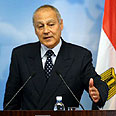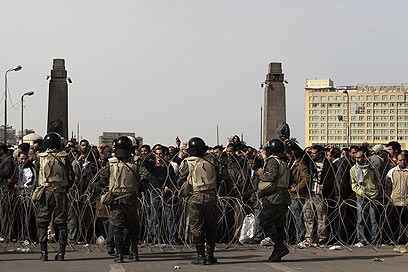
Egypt, US swap barbs as tension mounts
FM Abul Gheit says Obama administration 'imposing its will' on 'great friend.' White House: Process for regime change does not appear to be in line with people of Egypt
A top Egyptian minister accused the United States Wednesday of imposing its "will" on its Arab ally, even as the White House warned Cairo had fallen short of a "minimum threshold" for reform.
Egyptian Foreign Minister Ahmed Abul Gheit lashed out in a television interview on a day when Washington also stiffened its line towards Egyptian Vice President Omar Suleiman, who has opened a dialogue with opposition groups.
Amid warnings by the Egyptian government of a military crackdown on mounting protests, the US government appealed again on armed forces it helped to build with billions of dollars in military aid to show restraint.
Abul Gheit condemned US rhetoric on a crisis sparked by days of opposition protests in Egypt, in an interview with PBS television, complaining that Washington had called for a political transition "now" and "immediately."
"When you speak about 'prompt,' 'immediate,' 'now,' as if you are imposing on a great country like Egypt, a great friend that has always maintained the best of relationship with the United States, you are imposing your will on him," Abul Gheit said.
"Egypt and the president of Egypt, the government of Egypt have already started and the Egyptian president laid down a road map and allowed or asked the VP to engage in discussions on the road map with the different opposition groups.
"So for Americans to come and say 'Change is now,' but already we are changing. Or 'You start now,' we started last week," Abul Gheit said.
Asked whether he regarded the advice provided by US Vice President Joe Biden on Tuesday as helpful, Foreign Minister Aboul Gheit told the PBS NewsHour program "not at all" according to an interview transcript provided by the US TV broadcaster.
US spokesmen have repeated a mantra hundreds of times that it is not up to Washington to dictate Egypt's future -- saying the demonstrators cramming Cairo's Tahrir Square are the primary source of demands for change.
The Obama administration has battled to retain a coherent line on the crisis, as it shows empathy with protestors, but tries to head off accusations, like Abul Gheit's, that it is orchestrating a wave of Middle Eastern unrest.
With exchanges between President Hosni Mubarak's Egypt and Washington becoming more tense, White House spokesman Robert Gibbs said the nascent dialogue between Suleiman and some opposition groups was insufficient.
"It is clear that what the government has thus far put forward has yet to meet a minimum threshold for the people of Egypt," Gibbs said, warning protests would only swell to greater numbers this week without action.

Rally at Cairo's Tahrir Square (Photo: AFP)
Gibbs specifically criticized steps taken by Suleiman himself.
"The process for his transition does not appear to be in line with the people of Egypt. We believe that more has to be done," said Gibbs.
"The government is going to have to be responsive to these concerns," he said, adding that failure to act would only make the protests in Cairo swell.
The stiffened US line on Suleiman's tactics followed comments by Secretary of State Hillary Clinton on Sunday that change in Egypt would take time -- seen in some areas as an embrace of Suleiman as the man to lead the transition.
Hundreds of demonstrators marched on parliament in Cairo on Wednesday, prompting Abul Gheit to warn the army would intervene to protect the country if the protests against Mubarak escalated.
"If chaos occurs, the armed forces will intervene to control the country, a step... which would lead to a very dangerous situation," the official MENA news agency said, paraphrasing an interview with Arabic-language satellite television channel Al-Arabiya.
Shortly after his comments, Washington renewed its calls on the Egyptian army to show restraint.
"We respect the role the Egyptian military has played so far, and we would encourage them to continue to show... the restraint that they have shown in recent days," State Department spokesman Philip Crowley said.
Gheit added that at the beginning of the Cairo protests last month he was "often angry, infuriated," by what he saw as a confusing message being sent by the US administration as the crisis unfolded.
Reuters contributed to the report
- Follow Ynetnews on Facebook










